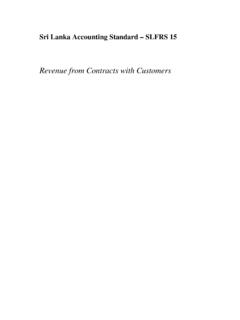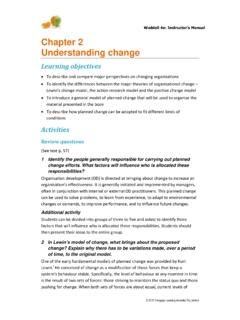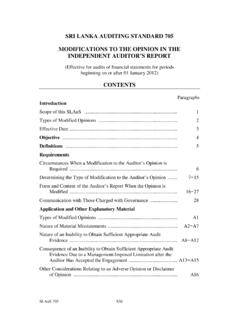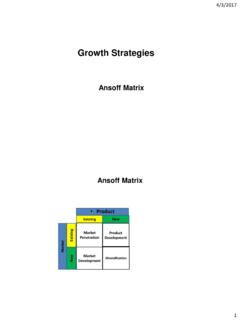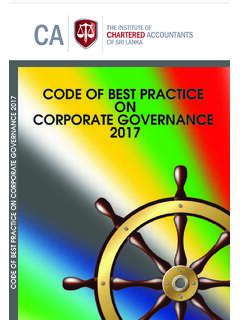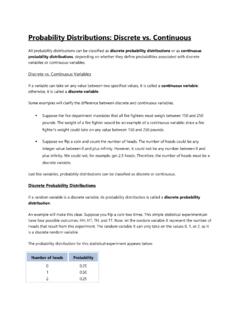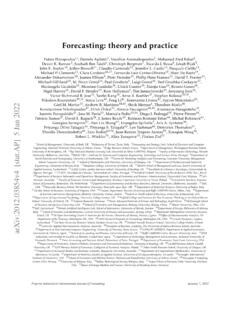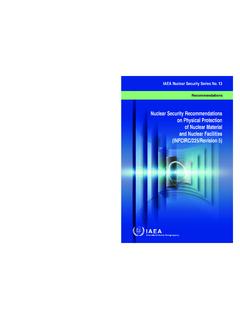Transcription of COMPANY LAW PART I - CA Sri Lanka
1 EDABS 301 - Law in Business (2019/2020) Lecturer: Shanila H. Gunawardena [ (Hons.) (Colombo), Attorney-at-Law, CTA (CASL)] 1 COMPANY LAW PART I (INTRODUCTION, TYPES OF COMPANIES, INCORPORATION ETC.) Companies Act, No. 7 of 2007 (as amended) (1) LEGAL STATUS AND CAPACITY OF A COMPANY SECTION 2 - A COMPANY is a body corporate identified by the name by which it has been registered. - Subject to the Articles of Association ( articles ) of the COMPANY , a COMPANY has the capacity to carry on or undertake any business or activity, do any act or enter into any transaction within or outside Sri Lanka .
2 - Subject to the laws of Sri Lanka or of any other country, a COMPANY has all the rights, powers and privileges, necessary for the aforesaid purpose of carrying on or undertaking any business or activity, doing any act or entering into any transaction within or outside Sri Lanka . (2) SEPARATE LEGAL ENTITY/ PERSONALITY - A COMPANY is separate and distinct from its members (those who own it), the shareholders. - A COMPANY is also different from those who direct and manage it, the directors and other employees.
3 - The existence of the COMPANY is unaffected by changes in its shareholders/ directors/ other employees. Accordingly, there is perpetual succession of the COMPANY regardless of the changes to any of its shareholders/ directors/ other employees. A COMPANY dies only when it is liquidated, wound up or becomes insolvent or bankrupt. - The COMPANY s assets, liabilities and contracts belong to the COMPANY ; not to the shareholders/directors/ other employees. - A COMPANY can sue its own employees and directors if they have caused any loss to the COMPANY by their actions.
4 - This separate existence of the COMPANY is a significant principle in COMPANY law. This principle was judicially established in 1897 by the House of Lords, England s highest court, in the famous case of Salomon vs. Saloman & Co. Ltd. (1897) AC 22. This important decision is called the Saloman principle . - Salomon vs. Salomon & Co. Ltd. (1897) AC 22: Salomon was a boot and shoe manufacturer who traded as a sole proprietor for nearly 30 years. Consequently, he incorporated a COMPANY and gave his wife and children 1 share each in the COMPANY and kept the balance shares in his own name.
5 As security for the shares in the COMPANY , Salomon obtained debentures from the COMPANY . Subsequently, the COMPANY went bankrupt. On the COMPANY s winding up it was found that its remaining assets were insufficient to satisfy both its debenture holders and its trade creditors. The question arose as to whether the debentures secured on assets issued to Salomon will get preference as against the other unsecured debts of the COMPANY . The unsecured trade creditors argued that Salomon and the COMPANY ( Salomon & Co.)
6 Ltd.) were truly the same person since he and his wife and children owned the COMPANY ; therefore, he could not owe money to himself; and accordingly, his rights as a debenture holder should not get priority and he should be paid after making payment to third party unsecured trade creditors. Court held: Salomon s COMPANY was a separate legal entity from Salomon, although he owned almost 99% of the shares, and therefore, the debentures issued to Salomon was a secured debt which should gain priority over the unsecured debts owed to the trade creditors.
7 Thus Salomon s claim should prevail over that of the third party trade creditors and proceeds of the assets should be first allocated to settle the debentures of Salomon. EDABS 301 - Law in Business (2019/2020) Lecturer: Shanila H. Gunawardena [ (Hons.) (Colombo), Attorney-at-Law, CTA (CASL)] 2 Salomon s case established many legal principals as to companies and recognized the following: principal of separate legal personality; family owned companies; the limited liability of members; a member can give a loan to a COMPANY ; a secured creditor (over assets), even if he is a member or director of the COMPANY , will have preference over unsecured creditors.
8 - Application of the Salomon principle in modern times: (i) Lee vs. Lee s Air Farming Ltd. [1961] AC 12: Lee was the MD of a small COMPANY that operated air planes. He owned all the shares in the COMPANY except for 1 share. He also piloted the COMPANY s planes. While piloting a plane he died and his widow claimed workmen s compensation insurance. The insurance COMPANY argued that since the COMPANY was owned basically by Lee, he could not also be a worker in the same COMPANY and denied liability.
9 Court held, however, that the COMPANY and Lee were separate and the widow s claim for insurance compensation was upheld. (ii) Trade Exchange (Ceylon) Ltd. vs. Asian Hotels Corporation (1981) 1 SLR 67: 95% of the shares in the hotel COMPANY were held by a Government corporation. Supreme Court held that the COMPANY and its shareholders were distinct legal entities and that the COMPANY did not become an agent of the Government even though almost all the shares were held by a Government corporation.
10 - Corporate veil & lifting the corporate veil The doctrine in Salomon s case caste a veil over the personality of a COMPANY through which no one can see. Sometimes the courts will look behind what is called the veil or mask of incorporation to ascertain whether a COMPANY is really different from its major shareholder(s). The term lifting the veil comes from the practice of Christian wedding ceremonies where the bride comes to the church with her face covered in a veil and after the religious ceremony is completed, the veil is lifted or uncovered disclosing the bride s face.
